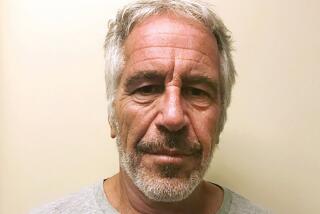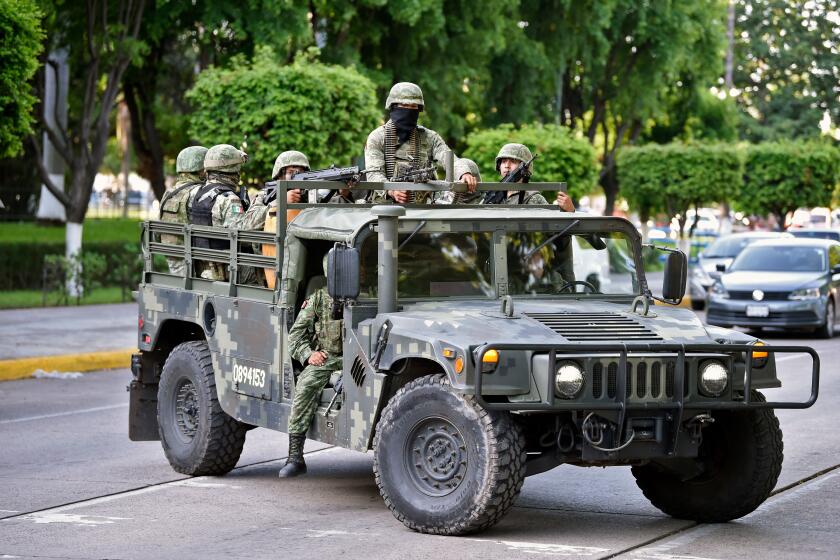A lion in winter stalking Canada’s Mulroney
Talk about the Invisible Hand.
In the late 1960s, Canada was swept by “Trudeaumania”--a “mysterious force . . . that had something to do with sexuality,” as two authors who lived through the phenomenon recall it.
Canada, a country not given to electing flamboyant leaders, had made as its prime minister Pierre Elliott Trudeau, one of the most driven, self-assured, combative and intellectually compelling heads of government any of the modern Western democracies had ever seen.
The Jesuit-educated, bilingual Trudeau campaigned for office in bathing trunks, alternating coolly Cartesian speeches with trampoline back flips and jackknife dives into swimming pools. As prime minister he hosted John Lennon and Yoko Ono, dated Barbra Streisand and dispensed advice to the likes of Henry A. Kissinger, John Kenneth Galbraith and Andre Malraux.
He married a woman young enough to be his daughter and then some. His early public appearances elicited hysterical screams from miniskirted teen-agers.
“My goodness, Pierre is like a Beatle!” exclaimed his sister, Suzette Rouleau.
He had everything his American counterpart, Richard M. Nixon, didn’t have--and a resentful Nixon can be heard, even today, trying to dismiss Trudeau with an anatomically rude epithet in the White House tapes released during the Watergate era. (“I’ve been called worse things by better people,” Trudeau said after the tape transcripts were published.)
In all that he said and did, Trudeau celebrated a strong, centralized, federalist vision of Canada. Some Canadians loved him for it; others came to view him with emotions that stand out in the annals of hatred. But throughout his 15 years in office, even those who despised him were grudgingly proud to have him represent their country before the world.
“Trudeau had his charms, not the least of them the delicious wickedness many Canadians felt because they had dared to elect such a fabulous smart-ass as prime minister,” recalls Peter C. Newman, a business columnist at McLean’s magazine.
“No other country could boast of a leader who slid down a banister at summit meetings, yelled an obscenity in French to striking mail truck drivers, who could skin dive, high dive, ride a unicycle, earn a brown belt in judo and be voted ‘the world’s seventh-sexiest man’ by London’s Daily Sketch.”
Those were the 1960s and ‘70s. But this is 1992--a crisis year for Canada. The province of Quebec is poised to secede, threatening to undo the very federalist dream that Trudeau devoted his political life to. And so Canadian federalists are waiting now, counting on Trudeau to do something, to defend his life’s work and save the country.
At first glance, it would seem a slender hope.
Since retiring from politics in 1984, Trudeau has shown little outward inclination to influence national affairs. He spends his days practicing law at a minor Montreal firm, rarely dealing directly with clients and never--God forbid--setting foot in court. He refuses to give interviews. Friends say that--unlike most retired politicians--he never talks about the years gone by. They say he is a happy and fulfilled man, with no interest whatsoever in making a political comeback.
Trudeaumania, it would seem, is a thing of the distant past. (To the delight of the nation, the now-divorced Trudeau did father a baby out of wedlock last year, at age 71--but more on that later.)
“His party is out of power, debt-ridden and divided,” writers Stephen Clarkson and Christina McCall note in their book, “Trudeau and Our Times.”
“His entourage has shrunk to a few loyalists. . . . His liberal interventionist ideas have been out of fashion for at least a decade. His vision of a Canadian federalist Utopia has been shattered. . . . There is no big money backing him. . . .”
But look again.
Even from the sidelines, seemingly without the slightest effort, Trudeau still manages to shape Canadian political events as no other person can. There may no longer be Trudeaumania, but there is certainly a powerful, behind-the-scenes Trudeau pull.
“He haunts us still,” say Clarkson and McCall.
Consider just a few of the ways in which Canadians have shown their yearning for their departed leader:
-- In 1990, Trudeau co-edited a book--not his long-awaited memoirs but a collection of essays on what must be one of the most plodding topics on Earth: the Canadian government. It topped the bestseller lists for months.
-- Polls repeatedly show that if Trudeau were to run for election today, he would sweep the country--even in Quebec, where Francophone nationalists regard him as a traitor to their cause. And even though there isn’t a prayer of a chance of a Trudeau candidacy.
-- Last November, Liberal Party pols refused to let Trudeau show his face at a party fund-raiser, for fear that the slightest glimpse of the famous retiree would send television crews scurrying toward him, stealing the limelight from them.
Of all the ways in which Trudeau still makes his presence felt, it is on Canada’s wrenching constitutional debate that he exerts his hidden powers most. And that is not surprising, for throughout his years in office, it was always Trudeau’s dream--his “magnificent obsession,” as Clarkson and McCall put it--to unite this perennially divided country under law.
The great divide within Canada is, of course, along linguistic lines. Canadian Francophones, the vast majority of whom live in Quebec, see themselves as an imperiled ile de France in the rising sea of English that is North America.
From their point of view, the worst thing that could happen is assimilation into English life. And for Quebec nationalists, the sturdiest safeguard against assimilation is secession from Canada.
Trudeau is a Quebecer, but he is not a unilingual Francophone--and certainly not a nationalist. The bicultural son of a Francophone father and an Anglophone mother, he has always looked upon French-Canadian nationalism as a scourge.
And the most potent weapon in the fight against Quebec nationalism, Trudeau believed, was the Canadian constitution.
Trudeau’s plan was to knit up Quebec with English-speaking Canada in three ways: by entrenching power in the federal government, by creating a truly bilingual state from the Atlantic to the Arctic and the Pacific and by guaranteeing Canadian minorities--Francophones in particular--legal protection under a Charter of Rights.
But Trudeau never implemented his vision fully; there was simply too much resistance.
As for entrenching strong governing powers in Ottawa, there is still jealous opposition from Canada’s 10 power-hungry provinces.
And as for a constitutional Charter of Rights, Trudeau got as far as “patriating” the Canadian constitution from England (up until then, it had been an act of the British Parliament) with a charter attached--but before it could become the ultimate national compact, Quebec refused to ratify it.
That’s where things stood when Trudeau retired. Though Quebecers were still unhappy with their place in the Canadian confederation, at least things seemed quiet on the linguistic-constitutional front.
And then along came Brian Mulroney.
Mulroney, a Progressive Conservative, elected prime minister in 1984, had a wholly different vision of Canada and Quebec’s place in it. Where Trudeau had been uncompromising on matters of principle, Mulroney--a former labor lawyer--was a seasoned negotiator, expert at cutting deals. Mulroney wanted to appease the Quebec Francophones, to persuade them to ratify the constitution--and to do that, he was willing to negotiate away federal powers and make concessions to the provinces.
But then Trudeau fought back.
In 1987, Trudeau published a single essay--in English in the Toronto Star and in French in Montreal’s La Presse--on Mulroney’s constitutional tinkering.
“It would be difficult to imagine a more total bungle,” he sneered, complaining that to make Quebec “distinct” under law would be to give it carte blanche to trample the rights of its minority Anglophones.
“Those Canadians who fought for a single Canada, bilingual and multicultural, can say goodby to their dream,” he said.
With a few well-chosen words, Trudeau changed the course of Canadian history.
Suddenly, Canadians were roused from their torpor. Groups that up until then had been concentrating on non-constitutional causes--the National Action Committee on the Status of Women, for instance, or the Assembly of First Nations--now declared war on Mulroney’s amendments.
Within the Liberal Party itself, Trudeau proxies emerged, eager to take up the fight at a provincial level. (One Trudeau acolyte was Newfoundland Premier Clyde Wells, and therein lies the tale of Trudeau’s latest offspring. The mother of the baby was Wells’ constitutional adviser, and--to the glee of most Canadians--the conception apparently took place while Trudeau and his followers were at the height of their anti-Mulroney organizational fervor.)
The amendments went down to a crashing and, for Mulroney, deeply humiliating defeat.
Quebecers were outraged at the country’s refusal to amend the constitution in their favor--so outraged that they have scheduled a referendum for this October on whether or not to stay with Canada. Opinion polls suggest varying outcomes, but it appears that if Quebec is given the chance to split, it will do so.
Quebecers view Trudeau as the engineer of the whole unpleasant business. It stands to become one of history’s great ironies: Trudeau acted out of a determination to protect his federalist principles; but as a result, he may have set in motion Quebec’s departure from Canada and the destruction of the country Trudeau had tried to build.
Since the reverberations from his essay died away, Trudeau has made few public political appearances. (Friends say he spends his free time mountain climbing, deep-sea diving, opening art exhibitions and raising his three sons by his former wife Margaret.)
Occasionally, he will make a speech on matters constitutional, and these never fail to make a sensation. But for the most part, things have been quiet.
“These days, Mr. Trudeau is a lion in winter,” writes political columnist Jeffrey Simpson in the Toronto Globe and Mail.
Until only recently, Trudeau had been unwilling to cooperate with many would-be TV biographers. But after his book of essays proved so successful, friends say, he changed his mind and decided a television retrospective could convey his constitutional views to an even wider audience.
In Quebec, Francophone nationalists know a threat when they see one: A splashy, pro-Trudeau television drama--particularly one that might air just before the sovereignty referendum--could do irreparable damage to their cause.
But federalists remain watchful, hopeful.
“Caged lions, especially this one, do not usually remain silent forever,” says Simpson.
More to Read
Sign up for Essential California
The most important California stories and recommendations in your inbox every morning.
You may occasionally receive promotional content from the Los Angeles Times.










